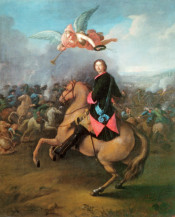
Peter I’s Poltava speech: truth and fiction
On July 8 (June 27, old style), 1709, Peter I delivered his famous speech on the Poltava field. This speech preceded one of the most important battles in the history of the Northern War - the battle with the Swedish army under the command of Charles XII. Rare materials testifying to this period of Russian history are available in the Poltava section of the Peter I collection, prepared by the Presidential Library to mark the anniversary of the first Russian emperor.
The victory in the Battle of Poltava was extremely important for the young Russian army, seeking to expand and strengthen the borders of Russia. In order to raise the morale of the army, dispel doubts and affirm the will to win, it was necessary to find verified, trustworthy words that would not leave a “gap” between personal will and military duty. After examining the formation, the emperor turned to the soldiers: “Warriors! Now the hour has come that will decide the fate of the Fatherland. So, you should not think that you are fighting for Peter, but for the state that was entrusted to Peter, for your family, for the Fatherland, for our Orthodox faith. And you should tell about Peter that his life is not dear to him, if only Russia would live in bliss and glory for your well-being. This is how the Poltava speech of Peter I sounds in the modern edition. But there are several versions of this speech, one of which is available in the book of the historian Pyotr Andrianov Peter I and Poltava (1909), which is posted on the Presidential Library’s portal.
The main source for researchers is the text of the speech, written down by an associate and like-minded person of Peter I Feofan Prokopovich (1681-1736) and included by him in the "History of Emperor Peter the Great from his birth to the Battle of Poltava and the capture of the rest of the Swedish troops at Perevolochna inclusive".
However, there is a skeptical point of view about the existence of this speech at all. So, for example, the Russian General Pavel Gudim-Levkovich (1842–1907) believed that Feofan Prokopovich composed this speech, since in the 18th century there was still no tradition of giving orders to the troops, because soldiers were considered “mechanical force” and commanders to he was not contacted.
Chronicles and other documentary sources that have survived to this day say the opposite. History keeps many examples when a lively, bright and inspired Russian word, uttered by an experienced ruler or commander in a confident and sincere voice, conveyed inner strength to every listener and inspired the will to win.
The speech spoken by Peter I on the Poltava field has undergone many "adventures" over three centuries. This is due to the fact that there is no primary written document of this speech, signed by Peter I himself. place. Thus, the text of Feofan Prokopovich cannot be recognized as a written order of Peter I, which hardly existed. But it is possible that Feofan Prokopovich conveys the main thoughts of Peter I, expressed in separate appeals during the review of the troops.
It is likely that, on the initiative of the emperor's associates, this speech could have been recorded by some other eyewitness and transferred to the archive. Historians Ivan Golikov (1735-1801) and Dmitry Buturlin (1790-1849), who analyzed historical documents, offered their own versions of the text of the Poltava speech of Peter I. There is also an assumption that Peter I delivered not one speech, but several on the Poltava field.
In any case, the very fact of the existence of the Poltava speech indicates that in the era of Peter I, the Russian word became an instrument of eloquence and rhetoric. If in the pre-Petrine time the Old Church Slavonic language was the language of the church and culture, and the Russian language was used for everyday communication, then under Peter I the Russian language goes beyond the limits of everyday life. Public speeches began to be used to glorify, sing and encourage the victory of the Russian army. If you carefully study the speeches of Peter I, spoken at different times and in different circumstances, you can find a common meaning for his speeches - the idea of the state good of Russia. Regardless of whether this particular speech was actually delivered by Peter I before the start of the battle of Poltava, or whether it was an “interpretation” of his contemporaries, the significance that this speech acquired for Russian history is important.
By the way, among the awards granted by the tsar to the participants in the Battle of Poltava were “great villages”, “noble sums of money”, “chancellery virtues”, as well as “royal portraits showered with expensive diamonds”. Details are reflected in the book by Ivan Golikov, which is available on the Presidential Library’s portal.
After the victory over the Swedes in 1709, a new historical period of existence began for our country. The Poltava speech delivered before the battle is a significant event not only in the political history of Russia.
Peter I’s Poltava speech is the most important stage in the history of Russian eloquence. This is an example of the use of that verbal gift, in which the correct, precise word combines both power and truth, is both a crushing sword and a protective shield. In fact, the Poltava speech of Peter I is an appeal to subsequent generations, an admonition that in a difficult hour for the country, the preservation of one's kind, faith and Fatherland is the preservation of the "bliss" of Russia.

